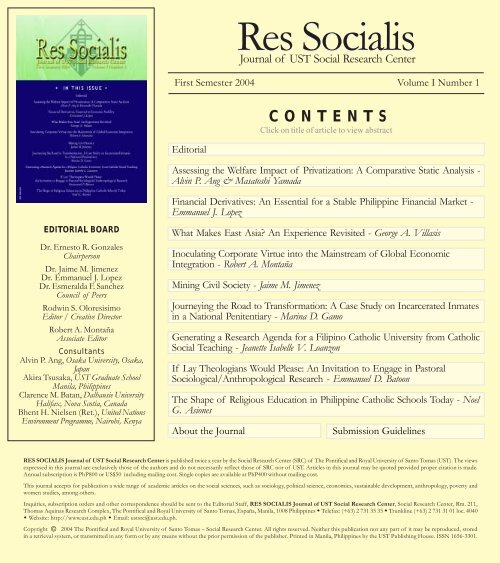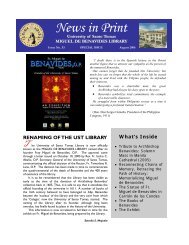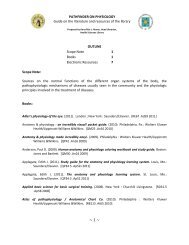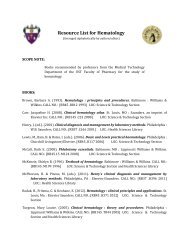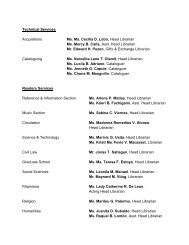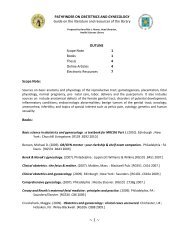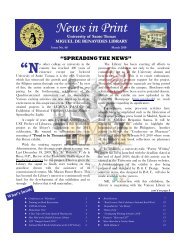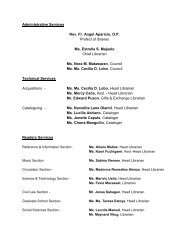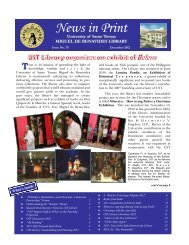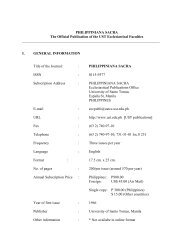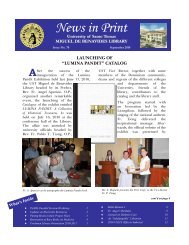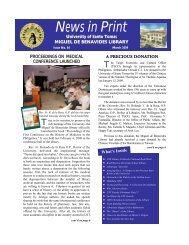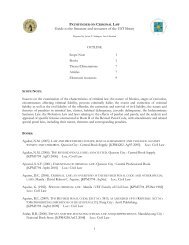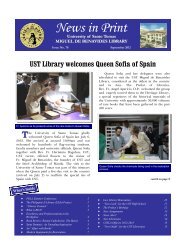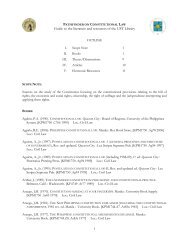Res Socialis Vol I N.. - University of Santo Tomas
Res Socialis Vol I N.. - University of Santo Tomas
Res Socialis Vol I N.. - University of Santo Tomas
Create successful ePaper yourself
Turn your PDF publications into a flip-book with our unique Google optimized e-Paper software.
<strong>Res</strong> <strong>Socialis</strong><br />
Journal <strong>of</strong> UST Social <strong>Res</strong>earch Center<br />
First Semester 2004 <strong>Vol</strong>ume I Number 1<br />
Editorial<br />
C O N T E N T S<br />
Click on title <strong>of</strong> article to view abstract<br />
Assessing the Welfare Impact <strong>of</strong> Privatization: A Comparative Static Analysis -<br />
Alvin P. Ang & Masatoshi Yamada<br />
Financial Derivatives: An Essential for a Stable Philippine Financial Market -<br />
Emmanuel J. Lopez<br />
EDITORIAL BOARD<br />
Dr. Ernesto R. Gonzales<br />
Chairperson<br />
Dr. Jaime M. Jimenez<br />
Dr. Emmanuel J. Lopez<br />
Dr. Esmeralda F. Sanchez<br />
Council <strong>of</strong> Peers<br />
Rodwin S. Oloresisimo<br />
Editor / Creative Director<br />
Robert A. Montaña<br />
Associate Editor<br />
Consultants<br />
Alvin P. Ang, Osaka <strong>University</strong>, Osaka,<br />
Japan<br />
Akira Tsusaka, UST Graduate School<br />
Manila, Philippines<br />
Clarence M. Batan, Dalhausie <strong>University</strong><br />
Halifax, Nova Scotia, Canada<br />
Bhent H. Nielsen (Ret.), United Nations<br />
Environment Programme, Nairobi, Kenya<br />
What Makes East Asia? An Experience Revisited - George A. Villasis<br />
Inoculating Corporate Virtue into the Mainstream <strong>of</strong> Global Economic<br />
Integration - Robert A. Montaña<br />
Mining Civil Society - Jaime M. Jimenez<br />
Journeying the Road to Transformation: A Case Study on Incarcerated Inmates<br />
in a National Penitentiary - Marina D. Gamo<br />
Generating a <strong>Res</strong>earch Agenda for a Filipino Catholic <strong>University</strong> from Catholic<br />
Social Teaching - Jeanette Isabelle V. Loanzon<br />
If Lay Theologians Would Please: An Invitation to Engage in Pastoral<br />
Sociological/Anthropological <strong>Res</strong>earch - Emmanuel D. Batoon<br />
The Shape <strong>of</strong> Religious Education in Philippine Catholic Schools Today - Noel<br />
G. Asiones<br />
About the Journal<br />
Submission Guidelines<br />
RES SOCIALIS Journal <strong>of</strong> UST Social <strong>Res</strong>earch Center is published twice a year by the Social <strong>Res</strong>earch Center (SRC) <strong>of</strong> The Pontifical and Royal <strong>University</strong> <strong>of</strong> <strong>Santo</strong> <strong>Tomas</strong> (UST). The views<br />
expressed in this journal are exclusively those <strong>of</strong> the authors and do not necessarily reflect those <strong>of</strong> SRC nor <strong>of</strong> UST. Articles in this journal may be quoted provided proper citation is made.<br />
Annual subscription is PhP800 or US$50 including mailing cost. Single copies are available at PhP400 without mailing cost.<br />
This journal accepts for publication a wide range <strong>of</strong> academic articles on the social sciences, such as sociology, political science, economics, sustainable development, anthropology, poverty and<br />
women studies, among others.<br />
Inquiries, subscription orders and other correspondence should be sent to the Editorial Staff, RES SOCIALIS Journal <strong>of</strong> UST Social <strong>Res</strong>earch Center, Social <strong>Res</strong>earch Center, Rm. 211,<br />
Thomas Aquinas <strong>Res</strong>earch Complex, The Pontifical and Royal <strong>University</strong> <strong>of</strong> <strong>Santo</strong> <strong>Tomas</strong>, España, Manila, 1008 Philippines • Telefax: (+63) 2 731 35 35 • Trunkline (+63) 2 731 31 01 loc. 4040<br />
• Website: http://www.ust.edu.ph • Email: ustsrc@ust.edu.ph.<br />
Copyright © 2004 The Pontifical and Royal <strong>University</strong> <strong>of</strong> <strong>Santo</strong> <strong>Tomas</strong> – Social <strong>Res</strong>earch Center. All rights reserved. Neither this publication nor any part <strong>of</strong> it may be reproduced, stored<br />
in a retrieval system, or transmitted in any form or by any means without the prior permission <strong>of</strong> the publisher. Printed in Manila, Philippines by the UST Publishing House. ISSN 1656-3301.
A New Page in the History <strong>of</strong> UST SRC Unfolds<br />
The inspiration behind the creation <strong>of</strong> this journal emanated from the definitions <strong>of</strong> ‘authentic human<br />
development’ espoused by His Holiness Joannes Paulus PP. II in his oeuvre, Sollicitudo rei socialis, which he<br />
wrote last 30 December 1987 on the tenth year <strong>of</strong> his Pontificate. Today, 17 years after its initial proclamation,<br />
the relevance <strong>of</strong> this Papal Encyclical had never been more germane, especially at this conjecture <strong>of</strong><br />
human history at the dawn <strong>of</strong> the 21st century.<br />
Peoples and individuals aspire to be free: their search for full development signals their desire<br />
to overcome the many obstacles preventing them from enjoying ‘a more humane life.’ It is<br />
fitting to add that the aspiration to freedom from all forms <strong>of</strong> slavery affecting the individual<br />
and society is something noble and legitimate. This, in fact, is the purpose <strong>of</strong> development,<br />
or rather liberation and development, taking into account the intimate connection between<br />
the two.<br />
In this regard, RES SOCIALIS Journal <strong>of</strong> UST Social <strong>Res</strong>earch Center is a contribution to this call <strong>of</strong> the<br />
Holy Pope for colossal efforts in the fulfillment <strong>of</strong> authentic human development. This journal is a scholarly<br />
pursuit shaped by both scientific validations and transcendent moral ethical discourse, which had been, is,<br />
and will continue to be the salient nature <strong>of</strong> the Pontifical and Royal <strong>University</strong> in Asia.<br />
The timeliness <strong>of</strong> this type <strong>of</strong> scholarly endeavor in social research is authenticated by the current<br />
developments for integralism in the social sciences and unification <strong>of</strong> the physical sciences. The on-going<br />
global search for effective solutions to the dichotomy created by technological advance vis-à-vis total human<br />
liberation is marked by the protracted conflict between material progress and authentic human development.<br />
Humanity, in search for life and freedom, was instead entrapped by the toll <strong>of</strong> material progress, which<br />
actually is a war against the principle <strong>of</strong> human harmony and peace and <strong>of</strong> modern economic slavery <strong>of</strong><br />
poorer countries, which are against the principle <strong>of</strong> Justice.<br />
On the methodological front, the established social and economic doctrines no longer represent the essence<br />
<strong>of</strong> social reality today. The search for a better framework has paved the way towards the integration <strong>of</strong> the<br />
social sciences under a more cohesive framework <strong>of</strong> analysis that weaves both the scientific and moral<br />
ethics. Likewise, this is also dramatized by the ongoing paradigm shifts institutionalized in the establishment<br />
<strong>of</strong> the 13 new research centers in the USA, in particular, and the growing scholarly interests in this new<br />
reality in many parts <strong>of</strong> the globe today, in general.<br />
Our application <strong>of</strong> this new framework connects UST SRC with the on-going social ferment and public<br />
mobilizations in the country. Our service is directly in partnership with the common people’s initiatives and<br />
movements. The Center is thus very honored to serve as the technical arm <strong>of</strong> the Bishops Conference <strong>of</strong> the<br />
Philippines in matters <strong>of</strong> social, economic, cultural and ecological research as well as development concerns.
As the Center celebrates her 25 th Anniversary come December 2004, this launching <strong>of</strong> RES SOCIALIS<br />
signals the wealth <strong>of</strong> endeavors designed to create a level <strong>of</strong> awareness <strong>of</strong> what UST SRC had become after<br />
these many years. The recognition <strong>of</strong> the past efforts <strong>of</strong> the previous administrators <strong>of</strong> UST SRC must not be<br />
neglected so that one is able to see the whole picture <strong>of</strong> what this research institution had become today. The<br />
myriad <strong>of</strong> publications produced and institutional alliances forged by the Center more than two decades ago<br />
resonate the rigorous efforts undertaken by those predecessors who have made Social <strong>Res</strong>earch Center what<br />
it is today. We, who are mere beneficiaries <strong>of</strong> this vision <strong>of</strong> our predecessors, are tasked with these<br />
responsibilities to carry on forward towards the realization <strong>of</strong> the dream to make UST SRC a major contributor<br />
and force in public mobilization for social transformation.<br />
The current research clusters <strong>of</strong> the Center are (a) Sustainable Development and Environmental Management,<br />
(b) Economics and Business <strong>Res</strong>earch, (c) Socio-Cultural, Pastoral and Church Affairs, (d) Women and<br />
Poverty, and (e) Family <strong>Res</strong>earch. This early, the UST Social <strong>Res</strong>earch Center had provided the CBCP with<br />
research outputs (Asian Family, Socio-pastoral Surveys <strong>of</strong> Dioceses, etc.) designed specifically to the needs<br />
<strong>of</strong> the Bishops <strong>of</strong> the Philippines to anchor their prophetic pronouncements to facts analyzed by using the<br />
accepted methodological standards in a scientific social research.<br />
In behalf <strong>of</strong> all the people who have shared their great talents to ensure the realization <strong>of</strong> this dream, the<br />
editorial board, researchers, staff, and friends, I dedicate this maiden issue <strong>of</strong> RES SOCIALIS Journal <strong>of</strong><br />
UST Social <strong>Res</strong>earch Center to all people who believe that the highest form <strong>of</strong> research is one that seeks for<br />
the Ultimate Truth.<br />
Ernesto R. Gonzales<br />
Chairperson<br />
SRC Council <strong>of</strong> Peers<br />
BACK
RES SOCIALIS Journal <strong>of</strong> UST Social <strong>Res</strong>earch Center • First Semester <strong>Vol</strong>. I No. 1 pp.4-11<br />
Assessing the Welfare Impact <strong>of</strong> Privatization:<br />
A Comparative Static Analysis a<br />
Alvin P. Ang a & Masatoshi Yamada b,c<br />
ABSTRACT<br />
Privatization <strong>of</strong> public corporations has become a norm in both developing and developed economies.<br />
It is perceived to have proven successful in bringing efficiency and competition to the economy and<br />
reducing public sector deficits. However, recent experiences <strong>of</strong> countries that have privatized show<br />
a need to further look into the welfare implications <strong>of</strong> this policy. This study looks into the theoretical<br />
aspects <strong>of</strong> privatization using a general equilibrium framework. It applies the method <strong>of</strong> comparative<br />
statics analyzing two conditions <strong>of</strong> the economy, i.e., before and after privatization, using a<br />
representative-consumer model.<br />
Keywords: privatization, comparative static analysis, developing economy<br />
a<br />
Graduate Student, Graduate School <strong>of</strong> Economics, Osaka <strong>University</strong>; <strong>Res</strong>earch Associate, UST-SRC & Economics Pr<strong>of</strong>essor [on study-leave], Faculty <strong>of</strong> Arts &<br />
Letters and Graduate School, The Pontifical and Royal <strong>University</strong> <strong>of</strong> <strong>Santo</strong> <strong>Tomas</strong>, Manila, Philippines. Email: aljobendav@ybb.ne.jp, godblessyouph@hotmail.com.<br />
b<br />
Pr<strong>of</strong>essor, Graduate School <strong>of</strong> Economics, Osaka <strong>University</strong>.<br />
c<br />
The authors are grateful to Dr. Emilyn Cabanda <strong>of</strong> the Graduate School, <strong>University</strong> <strong>of</strong> <strong>Santo</strong> <strong>Tomas</strong>, Manila; Dr. Nancy Eleria, Dean, Graduate School, Colegio de San Juan de<br />
Letran; and, Pr<strong>of</strong>. Akira Tsusaka <strong>of</strong> the Graduate School <strong>of</strong> Business, De La Salle <strong>University</strong> Pr<strong>of</strong>essional Schools, Inc. Manila for their insightful comments for this paper.<br />
BACK
RES SOCIALIS Journal <strong>of</strong> UST Social <strong>Res</strong>earch Center • First Semester <strong>Vol</strong>. I No. 1 pp.12-18<br />
Financial Derivatives: Essential to Economic Stability a<br />
Emmanuel J. Lopez a<br />
ABSTRACT<br />
This paper presents the extent <strong>of</strong> derivatives use in the Philippine financial market, limited on regular<br />
derivatives transactions, such as spots, forwards, and swaps. Findings suggest that both government<br />
and corporate organizations utilize derivatives to manage foreign exchange risk and interest rate risk.<br />
Likewise, it was also found that not too many firms have capitalized on the advantages being <strong>of</strong>fered<br />
by financial engineering to design innovative mechanisms to raise capital, either for survival or<br />
expansion purposes. Most financial managers suggest that all local firms, including the Philippine<br />
government, must consider derivatives utilization to provide them the much-needed leverage in this<br />
highly competitive world. Although it will take a lot <strong>of</strong> innovation in the local scene to maximize the<br />
benefits that it can impart, the inevitable implementation <strong>of</strong> such kind <strong>of</strong> mechanism is a requirement<br />
to acquire an advantage in this complex world <strong>of</strong> competition.<br />
Keywords: financial derivatives, Philippine financial market, foreign exchange risk, interest rate risk<br />
a<br />
Dr. Lopez is <strong>Res</strong>earch Associate, UST-SRC, Chairperson for the Social Sciences and Economics Pr<strong>of</strong>essor, Faculty <strong>of</strong> Arts & Letters, The Pontifical and Royal<br />
<strong>University</strong> <strong>of</strong> <strong>Santo</strong> <strong>Tomas</strong>, Manila, Philippines. Email: ejlop@hotmail.com, ejlop@yahoo.com.<br />
BACK
RES SOCIALIS Journal <strong>of</strong> UST Social <strong>Res</strong>earch Center • First Semester <strong>Vol</strong>. I No. 1 pp.19-33<br />
What Makes East Asia? An Experience Revisited<br />
George A. Villasis a<br />
ABSTRACT<br />
The paper first illustrates how East Asia’s leading economies comparatively expand and translate<br />
trade into growth and per-capita income. Then, it describes how industrial development powers their<br />
trade engines to explain their comparative levels <strong>of</strong> economic development. Furthermore, a crosssection<br />
analysis <strong>of</strong> trade patterns reflects on their industrial development to complete the tradeindustry<br />
picture. The paper ends with a discussion on the competitive frames <strong>of</strong> their macro-economies<br />
in which they paint the picture <strong>of</strong> industrial and technological development. For reading convenience,<br />
figures and tables are placed after the text which is also footnoted with additional explanations.<br />
Keywords: East Asian economies, industrial development, macroeconomics<br />
a<br />
<strong>Res</strong>earch Associate, UST-SRC and Economics Pr<strong>of</strong>essor, College <strong>of</strong> Commerce and Accountancy, The Pontifical and Royal <strong>University</strong> <strong>of</strong> <strong>Santo</strong> <strong>Tomas</strong>, Manila,<br />
Philippines. Email: pr<strong>of</strong>gv2001@yahoo.com.<br />
BACK
RES SOCIALIS Journal <strong>of</strong> UST Social <strong>Res</strong>earch Center • First Semester <strong>Vol</strong>. I No. 1 pp.34-40<br />
Inoculating Corporate Virtue into the Mainstream <strong>of</strong> Global Economic<br />
Integration a<br />
Robert A. Montaña b<br />
ABSTRACT<br />
The integrative components <strong>of</strong> the open market naturally give birth to a domino effect <strong>of</strong> economic<br />
phenomena in accordance with the terms <strong>of</strong> the invisible hand – breaking a balance in the supply and<br />
demand <strong>of</strong> both capital and labor. This paper presents the thesis that this balancing <strong>of</strong> social and<br />
political forces is detrimental to the lower sectors <strong>of</strong> the labor force. The scenario worsens as more<br />
competitive elements play as attractive nuisances to corporate thinking; a model which is grounded<br />
in the expansion <strong>of</strong> organizational pr<strong>of</strong>it. By redefining the concept <strong>of</strong> corporate virtue in terms <strong>of</strong><br />
the post-modern managerial prerogative, a paradigm shift towards a more humanized global market<br />
is technically achievable.<br />
Keywords: corporate virtue, globalization, management<br />
a<br />
This article is the expanded version <strong>of</strong> the author’s work, Devaluating Virtue? Probing the Virtues <strong>of</strong> the Virtue Matrix (SRC Update 2003/n02-03:6,15-16).<br />
b<br />
<strong>Res</strong>earch Associate, UST-SRC and Philosophy Pr<strong>of</strong>essor, Faculty <strong>of</strong> Arts & Letters, The Pontifical and Royal <strong>University</strong> <strong>of</strong> <strong>Santo</strong> <strong>Tomas</strong>, Manila, Philippines. Email:<br />
montana_robert@hotmail.com.<br />
BACK
RES SOCIALIS Journal <strong>of</strong> UST Social <strong>Res</strong>earch Center • First Semester <strong>Vol</strong>. I No. 1 pp.41-51<br />
Mining Civil Society a<br />
Jaime M. Jimenez b<br />
ABSTRACT<br />
As ‘civil society’ gained currency in the Philippines and many regions <strong>of</strong> the world in the 1990s, the<br />
term served as the ‘sound-bite’ that graced the presentations <strong>of</strong> political analysis in different journals,<br />
books, articles, magazines, and newspapers and gushed out <strong>of</strong> the mouths <strong>of</strong> people from all<br />
pr<strong>of</strong>essions. This could be likened to the moment when “the semantic transmutation from international<br />
to global took place so rapidly that theorization was overwhelmed by pr<strong>of</strong>essions <strong>of</strong> faith” (Mattelart<br />
1994, cited in Kelly, 1997). This article is divided into three sections. The first two sections provide a<br />
selective account <strong>of</strong> civil society literature that pertains to the excessive use <strong>of</strong> ‘civil society’ and the<br />
propensity to equate civil society with NGOs and POs. From this investigation, a ‘realist view’ <strong>of</strong><br />
civil society is presented with the aim <strong>of</strong> providing a perspective in employing civil society as a sociopolitical<br />
category.<br />
Keywords: civil society, Philippine society, NGOs/POs<br />
a<br />
This article is the expanded version <strong>of</strong> the author’s work, The Ambiguities <strong>of</strong> Civil Society (SRC Update 2003/n02-03:7,17).<br />
b<br />
<strong>Res</strong>earch Associate, UST-SRC and Political Science Pr<strong>of</strong>essor, Faculty <strong>of</strong> Arts & Letters, The Royal and Pontifical <strong>University</strong> <strong>of</strong> <strong>Santo</strong><strong>Tomas</strong>, Manila, Philippines.<br />
Email: jmjmnz@yahoo.com, artp9276@nus.edu.sg.<br />
BACK
RES SOCIALIS Journal <strong>of</strong> UST Social <strong>Res</strong>earch Center • First Semester <strong>Vol</strong>. I No. 1 pp.52-59<br />
Journeying the Road to Transformation: A Case Study on Incarcerated<br />
Inmates in a National Penitentiary<br />
Marina D. Gamo a<br />
ABSTRACT<br />
This paper sought, explored and analyzed the impact <strong>of</strong> the rehabilitation program on the eight (8)<br />
selected inmates <strong>of</strong> the Philippine Medium Security Camp or Camp Sampaguita in the Bureau <strong>of</strong><br />
Corrections, National Penitentiary, Muntinlupa City. This is a critical study <strong>of</strong> the five (5) rehabilitative<br />
elements being implemented by the Bureau, namely: higher education, livelihood, sports, talent<br />
development, and spiritual formation. The study utilized case study as the research design, and<br />
methodological triangulation (qualitative interviews, document analysis and visual analysis) as data<br />
gathering procedure. Findings <strong>of</strong> the study emulate the intention <strong>of</strong> the Bureau to reform the <strong>of</strong>fenders<br />
through its rehabilitative programs. The implementation <strong>of</strong> the abovementioned elements were found<br />
to require further enhancements to enable inmates to benefit from the program and for the penal<br />
system to transcend from its previous ‘punitive’ nature into an organization that provide ‘reformatory’<br />
services to those who have erred against the society.<br />
Keywords: rehabilitation program, Philippine penal system, rehabilitative elements<br />
a<br />
<strong>Res</strong>earch Associate, UST-SRC and Sociology Pr<strong>of</strong>essor, Faculty <strong>of</strong> Arts and Letter, The Pontifical and Royal <strong>University</strong> <strong>of</strong> <strong>Santo</strong> <strong>Tomas</strong>, Manila, Philippines. Email:<br />
babes_gamo@hotmail.com.<br />
BACK
RES SOCIALIS Journal <strong>of</strong> UST Social <strong>Res</strong>earch Center • First Semester <strong>Vol</strong>. I No. 1 pp.60-71<br />
Generating a <strong>Res</strong>earch Agenda for a Filipino Catholic <strong>University</strong> from<br />
Catholic Social Teaching<br />
Jeannette Isabelle V. Loanzon a<br />
ABSTRACT<br />
This paper proposes a research agenda based on the elements, principles and themes drawn from the<br />
Social Agenda published by the Pontifical Council for Justice and Peace. This agenda is an attempt to<br />
respond to the pyramid <strong>of</strong> inequality <strong>of</strong> income, wealth, and opportunity in the Philippine setting<br />
towards realizing a Eucharistic banquet <strong>of</strong> equals. Since Catholic social teaching “proposes a set <strong>of</strong><br />
principles for reflections, criteria for judgment, and directives for action” (Pontifical Council for<br />
Justice and Peace 2000 10), the suggested model presented here is a rhythm <strong>of</strong> information-actiontransformation.<br />
Finally, as Catholic social teaching embraces the whole person, the approach to<br />
research in a Catholic university is necessarily interdisciplinary.<br />
Keywords: Philippine society, Catholic social teaching, Catholic research agenda<br />
a<br />
<strong>Res</strong>earch Associate, UST-SRC and Dean, College <strong>of</strong> Commerce and Accountancy, The Pontifical and Royal <strong>University</strong> <strong>of</strong> <strong>Santo</strong> <strong>Tomas</strong>, Manila, Philippines. Email:<br />
jloanzon2000@yahoo.com.<br />
BACK
RES SOCIALIS Journal <strong>of</strong> UST Social <strong>Res</strong>earch Center • First Semester <strong>Vol</strong>. I No. 1 pp.72-81<br />
If Lay Theologians Would Please: An Invitation to Engage in Pastoral<br />
Sociological/Anthropological <strong>Res</strong>earch<br />
Emmanuel D. Batoon a<br />
ABSTRACT<br />
This study attempts to assist SRC lay theologians in formulating research types that combine theological<br />
form <strong>of</strong> rationality and social science form <strong>of</strong> rationality that could provide further empirical support<br />
to Catholic doctrine (not schemes that open the floodgates to heretical teachings) and that fit SRC’s<br />
organizational mandate and capabilities through a description <strong>of</strong> the types and evaluation <strong>of</strong> the<br />
solvency and practicability <strong>of</strong> theological and sociological/anthropological researches related to or<br />
could be related to religion. The findings tell that theological researches are <strong>of</strong> the following types:<br />
pure theological research, applied theological research, historical theological research, and pseudoscientific-theological<br />
research. These types <strong>of</strong> researches cannot solve the research difficulty <strong>of</strong> the<br />
lay theologians and are impracticable as they do not fit the SRC organizational mandate and capabilities.<br />
The findings also tell that sociological/anthropological researches related to or could be related<br />
to religion are <strong>of</strong> the following types: pure sociological/anthropological research on religion and<br />
applied sociological/anthropological research in the form <strong>of</strong> policy research or in the form <strong>of</strong> action<br />
research. With some modifications, these types <strong>of</strong> sociological/anthropological researches can solve<br />
the research difficulty <strong>of</strong> the lay theologians and are practicable as they fit the SRC organizational<br />
mandate and capabilities. Theses modified forms <strong>of</strong> types <strong>of</strong> sociological/anthropological research<br />
can be provisionally named, ‘Pastoral Sociological/Anthropological <strong>Res</strong>earch.’<br />
Keywords: pastoral research, sociological/anthropological research, lay theologians<br />
a<br />
<strong>Res</strong>earch Associate, UST-SRC and Sociology Pr<strong>of</strong>essor, Faculty <strong>of</strong> Arts and Letters, The Pontifical and Royal <strong>University</strong> <strong>of</strong> <strong>Santo</strong> <strong>Tomas</strong>, Manila, Philippines. E-mail:<br />
manny_batoon@yahoo.com<br />
BACK
RES SOCIALIS Journal <strong>of</strong> UST Social <strong>Res</strong>earch Center • First Semester <strong>Vol</strong>. I No. 1 pp.82-90<br />
The Shape <strong>of</strong> Religious Education in Philippine Catholic Schools Today<br />
Noel G. Asiones a<br />
ABSTRACT<br />
Commissioned by the Episcopal Commission on Catechesis and Catholic Education (ECCCE) and<br />
Catholic Educational Association <strong>of</strong> the Philippines (CEAP), the UST-Social <strong>Res</strong>earch Center (UST-<br />
SRC) conducted a mailed-survey questionnaire research in 2000 to determine a possibly overall<br />
picture <strong>of</strong> the present condition <strong>of</strong> Religious Education (RE) in Catholic Schools. <strong>Res</strong>pondents were<br />
asked on their perception <strong>of</strong> RE in terms <strong>of</strong> its content, methods and styles <strong>of</strong> teaching, programs<br />
and institutional supports and as well as clients or students attitudes towards effectiveness <strong>of</strong> RE<br />
agents and programs in achieving the goals <strong>of</strong> religious education in their respective schools. The<br />
respondents, both students and religious educators were selected using stratified proportionate<br />
sampling method from 1400 member-schools during the school year 2000-2001.<br />
Keywords: Philippine Catholic schools, religious education, teaching method<br />
a<br />
<strong>Res</strong>earch Associate, UST-SRC and Religion Pr<strong>of</strong>essor, Institute <strong>of</strong> Religion, The Pontifical and Royal <strong>University</strong> <strong>of</strong> <strong>Santo</strong> <strong>Tomas</strong>, Manila, Philippines. Email:<br />
noelgasi2000@yahoo.com.<br />
BACK
About the Journal<br />
RES SOCIALIS Journal <strong>of</strong> UST Social <strong>Res</strong>earch Center is a fresh addition to the long-lineup <strong>of</strong> quality<br />
publications <strong>of</strong> SRC in particular and UST in general—a scholarly publication envisioned to be a channel to<br />
express certain views <strong>of</strong> social relevance coupled with findings from individual researches.<br />
In this bi-annual publication, articles and commentaries intended to meet specific demands, are analyzed in<br />
their various perspectives, subjected to rigorous peer review, and are afterwards published and disseminated<br />
for academic scrutiny. From this fruitful language game, paradigms are created and re-created to establish<br />
their utilitarian values. Through RES SOCIALIS, SRC reaches out with humanitarian concern armed with<br />
intellectual acumen, to find lasting solutions to the tribulations besetting Philippine society today.<br />
This journal accepts for publication a wide range <strong>of</strong> academic articles on the social sciences, such as sociology,<br />
political science, economics, sustainable development, anthropology, poverty and women studies, among<br />
others.<br />
BACK
Submission Guidelines<br />
RES SOCIALIS Journal <strong>of</strong> UST Social <strong>Res</strong>earch Center considers for publication research articles, book<br />
reviews, annotated bibliographies, etc. on the different social science disciplines, including economics,<br />
sociology, political science, anthropology, religious studies, sustainable development, poverty and women<br />
studies, among others. <strong>Res</strong>earch articles are based on a standard research approach: quantitative (experimental<br />
or descriptive), qualitative, historical, or theoretical.<br />
Prospective authors should follow the guidelines set forth in the Chicago Manual <strong>of</strong> Style 13 th Edition before<br />
submitting a manuscript for consideration. In addition, all submissions to this Journal should have top,<br />
bottom, left and right margins set to one inch, using Garamond 12-point font, and double-spaced.<br />
<strong>Res</strong>earch manuscripts should not exceed 20 double-spaced pages (around 6,000 words), excluding the title<br />
page, abstract, biographical information, and references. The abstract should not exceed 100 words. Identifying<br />
information, including names <strong>of</strong> authors, addresses, phone numbers and E-mail addresses, should be provided<br />
in a cover letter addressed to the Editor. The authors are responsible for obtaining copyright permissions for<br />
previously published material. Endnotes should be used instead <strong>of</strong> footnotes. Book Review submission<br />
should not exceed two double-spaced pages (around 600 words), which should include author, title, date,<br />
publishers, number <strong>of</strong> pages, cost, ISBN, reference citations, as well as the reviewer’s name and institution.<br />
The editors will acknowledge receipt <strong>of</strong> manuscripts and send copies <strong>of</strong> articles to the SRC Council <strong>of</strong> Peers<br />
for blind review. Authors will be contacted after the review process, which generally takes a month to<br />
complete. Authors whose articles have been accepted will need to send a Micros<strong>of</strong>t Word file (via e-mail or<br />
in a diskette) and a printed version <strong>of</strong> the file.<br />
In addition, authors should adhere to the following UST SRC–specific guidelines for tables and figures:<br />
- All tables and figures must be placed in the appendix part <strong>of</strong> the article. Place a marker [put table/figure<br />
# here] within the text body.<br />
- Use Arial 10-point font. Double-space all tables for easy editing. Do not use any vertical or horizontal lines.<br />
- If derived from secondary sources, properly cite the source.<br />
- Number all tables in the order that they are mentioned in the text. Make sure that all used tables are correspondingly<br />
mentioned in text. Those not mentioned will be removed.<br />
- Define all measurement units and abbreviations in table notes.<br />
- Graphics or photographs are considered as figures and should not be labeled as tables.<br />
- All figures and complicated tables will be returned to the author for all minor adjustments before manuscript<br />
publication.<br />
Letters, manuscripts, reviews, or questions about submission guidelines should be addressed to the Editor,<br />
UST SRC or emailed to: ustsrc@ust.edu.ph, Attention: Rodwin S. Oloresisimo, Editor.<br />
BACK


